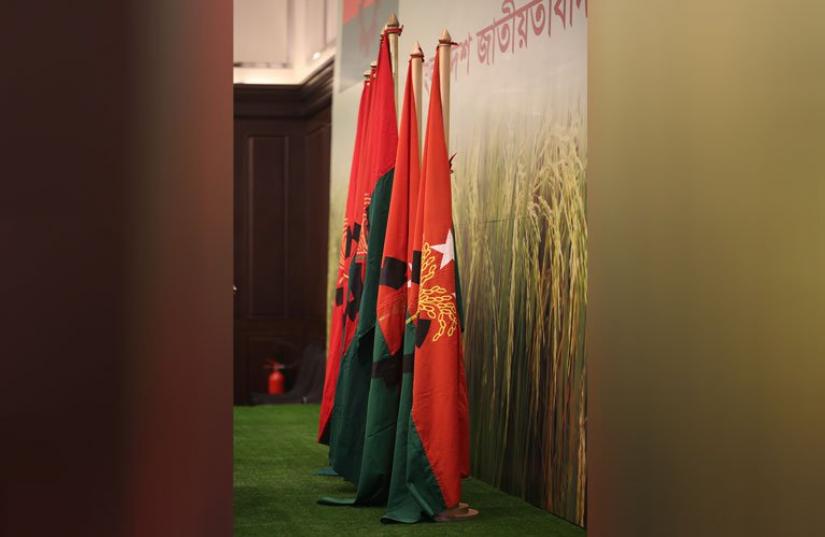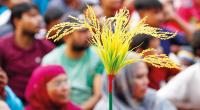 In the midst of arguably the toughest juncture in its history, the BNP has moved to formulate fresh strategies aimed at rediscovering its position in the political landscape.
In the midst of arguably the toughest juncture in its history, the BNP has moved to formulate fresh strategies aimed at rediscovering its position in the political landscape.
Looking to chalk future paths, the party is prioritizing two aspects— the spirit of the Liberation War and nationalistic views of the current generation and based on which the party hopes to return to power.
As part of this process, the BNP is inclining towards strengthening the Jatiya Oikya Front leaving out their 20-year long political ally Jamaat-e-Islami. The party’s leadership is also focused to gain back the international community’s confidence while upholding the national interest.
According to a number of top BNP leaders, the party is dealing with a number of challenges simultaneously.
Amid such political realities, BNP has chalked out plans to solve the issues in the most reasonable ways. It’s now focusing on organisational strength and mastering the art of global political strategies.
The party as a whole is prioritizing the release of their incarcerated chief Khaleda Zia, the leaders added.
In formulating the new political strategies the BNP top brass is focusing on the current generation’s belief and perception regarding the Liberation War; which was also a key reason behind forming the pre-polls alliance Jatiya Oikya Front with the Liberation War organisers, like Dr Kamal Hossain on board.
Speaking on the matter, pro-BNP intellectual Emajuddin Ahmed told Bangla Tribune, “I often have conversations with BNP acting Vice Chairman Tarique Rahman. So far I know, he wants to fix a new political goal for which the process of axing Jamaat is already underway.”
Referring to the independence war, which the Jamaat opposed, the former Dhaka University vice-chancellor said, “It’s good for the BNP if Jamaat distances themselves. Even if they don’t they will be forced to do so due to the circumstances.”
“The fact is Bangladesh became independent through the Liberation War,” he added.
BNP’s policymaking National Standing Committee member Barrister Jamir Uddin Sircar said, “We formed the Oikya Front and made Dr Kamal Hossain its chief. This is part of the same spirit.”
Two decades of alliance, who will abandon who?
According to several leaders and activists, BNP’s position as a party of freedom fighters was undermined when it allied with Jamaat in 1999 by forming the Four-party Alliance in 1999.
Several senior leaders told Bangla Tribune that two persons strongly advocated for Jamaat’s inclusion. Both the men are now deceased— former Prime Minister Kazi Zafar Ahmed and journalist, politician Anwar Zahid. They are said to have played the key role in presenting Jamaat as a significant party before Khaleda.
Besides, a national daily did its part in that regard, they added.
A close relative of Kazi Zafar claimed that some of the top Jamaat leaders frequently visited Khaleda’s Cantonment residence prior to the formation of alliance in 1999. Zafar used to take them to the former premier’s home as his relatives.
Close political colleague of Zafar and Jatiya Party (Kazi Jafar) acting Chairman Mostofa Jamal Haider told Bangla Tribune, “Zafar’s role to form the four-party alliance was the most significant.”
A former standing committee member of BNP told Bangla Tribune that Khaleda informed the policy making body of her decision to include Jamaat in their alliance during a meeting in 1999.
“I have taken a decision and you must promise me to accept it,” is the first thing she said joining the standing committee meeting.
Former BNP Secretary General Dr Badruddoza Chowdhury, who was present in that meeting, was unavailable for comments on the matter.
In 2001, four years after the alliance was formed, the BNP came to power and included Jamaat in forming the government.
A number of BNP leader now realise that including Jamaat in the administration as well as in the movement was a wrong political decision.
According to two members of the standing committee, following the formation of government, core members of the Khaleda Zia’s cabinet turned into a cabinet of ‘pro-Pakistanis.’
The core cabinet members included Saifur Rahman, Khandaker Mosharraf Hossain, Abdul Mannan Bhuiyan, Jamaat’s Motiur Rahman Nizami, Ali Ahsan Mohammad Mujahid and Salauddin Kader Chowdhury. The latter three have been executed after a special tribunal found them guilty of committing crimes against humanity during the 1971 Liberation War.
The two standing committee members also said that Saifur Rahman and Mannan Bhuiyan had internal feuds on issues which included a race to become the Deputy Leader of the House.
Their deliberations for that role in the end deprived KM Obaidur Rahman to become the House deputy leader. The then Secretary General Bhuiyan also had disagreements with Khandaker Mosharraf Hossain. This dispute ensued following BNP’s defeat in the 96 parliament election. When Mannan Bhuiyan became the secretary general, a fall out with the senior leaders followed. The leaders included Mosharraf Hossain, who was a top contender to become the secretary general.
Meanwhile, Bhuiyan, used the then state minister for home, Lutfuzzaman Babar, for his own interests. These internal dispute coupled with strong position of Jamaat leaders in the core cabinet, the then BNP regime was left in disarray in the running both the party and the government.
“BNP found Jamaat as a credible partner in 1991 while forming the government, when Jamaat with its 17 seats in the House supported the BNP,” said Sircar.
According to two senior policymaking leaders, back then the proposal to take support from the lawmakers led by Workers’ Party chief Rashed Khan Mennon was overlooked.
They claim that ultra-right BNP leaders Abdus Salam Talukder, Abdul Matin Chowdhury and Mostafizur Rahman played the vital role behind Khaleda’s decision to take Jamaat as an ally.
According to them, leaders like Badrudozza Chowdhury, Mir Shawkat Ali, Sheikh Razzak Ali, who were in favour of allying with Menon, failed to persuade Khaleda due to the ultra-right leaders of the party.
Standing Committee member Jamiruddin Sircar, however, maintains that Jamaat is a key factor when it comes to elections.
The BNP leadership, however, does not share his observation rather it believes that the political landscape in future will not hinge only on votes.
“History will judge the BNP’s relation with Jamaat, but that’s not the issue right now... The ruling party is now in a fix with its partners within the 14-party Alliance. I believe the BNP has to wait and continue its political process,” Vice-Chairman Shamsuzzaman Dudu said.
Meanwhile, calls have been raised from within the Jamaat to dissolve the party and re-emerge with a new name over the issue of the party’s role in 1971.
Its Assistant Secretary General Abdur Razzaq, the man who led the defence of 1971 war crimes convicts, has resigned from the party citing its failure to apologise for its anti-liberation role and reform party charter.
However, the long-time allies maintain different stances over cutting ties and it’s apparent that no one is interested to make the first move.
Senior leader Jamiruddin Sircar has always been in favour of keeping Jamaat as an ally. “Why should we ditch them? Let them leave us,” is what he says.
Jamaat leaders, however, said they were mulling it.
“The BNP has kept the alliance it leads inactive. But the Majis-e-Shura [highest policymaking body] is yet to decide on it,” Central Executive Committee member Syed Abdullah Md Taher told Bangla Tribune.
Speaking to Bangla Tribune earlier this month, Nayebe Ameer Mia Golam Parwar, however, rather came up with a straight forward remark.
“There’s nothing to beat around the bush over leaving the coalition. If we leave the alliance then we will do it publicly,” he said.
 Politics
Politics
30897 hour(s) 47 minute(s) ago ;
Morning 04:41 ; Friday ; Apr 26, 2024
BNP brainstorming new strategies
Send
Salman Tareque Sakil
Published : 07:30, Feb 17, 2019 | Updated : 21:50, Feb 19, 2019
Published : 07:30, Feb 17, 2019 | Updated : 21:50, Feb 19, 2019
0 ...0 ...
/hm/zmi/
Topics: Top StoriesExclusive
- KOICA donates medical supplies to BSMMU
- 5 more flights to take back British nationals to London
- Covid19: Rajarbagh, Mohammadpur worst affected
- Momen joins UN solidarity song over COVID-19 combat
- Covid-19: OIC to hold special meeting
- WFP begins food distribution in Cox’s Bazar
- WFP begins food distribution in Cox’s Bazar
- 290 return home to Australia
- Third charter flight for US citizens to return home
- Dhaka proposes to postpone D8 Summit
Unauthorized use of news, image, information, etc published by Bangla Tribune is punishable by copyright law. Appropriate legal steps will be taken by the management against any person or body that infringes those laws.
Bangla Tribune is one of the most revered online newspapers in Bangladesh, due to its reputation of neutral coverage and incisive analysis.
F R Tower, 8/C Panthapath, Shukrabad, Dhaka-1207 | Phone: 58151324; 58151326, Fax: 58151329 | Mob: 01730794527, 01730794528


